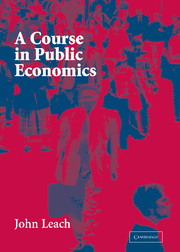Taxation and Efficiency
Published online by Cambridge University Press: 06 July 2010
Summary
It is inevitable that people will try to avoid paying taxes. These attempts are, in the aggregate, futile – the government ultimately does raise the revenue that it wants – but they do have important economic implications. The adjustments that people make in their attempts to dodge taxes reduce economic efficiency.
Governments have a role to play in the provision of public goods, and in the regulation of externalities and “increasing returns” industries. In each of these roles, the government's activities have the potential to reduce economic inefficiency. But these activities must be funded through taxation, and taxation generates other inefficiencies. The social benefits of additional government expenditures will at some point fall short of the social costs of the additional taxation required to finance them, so that the intervention reduces welfare instead of raising it. The welfare gains of intervention will be maximized if the government targets its expenditures to generate the greatest social gains, and designs its tax system to minimize the damage done by it. These issues are discussed in the next few chapters.
Governments also, to greater or lesser degrees, attempt to reduce economic disparities by redistributing income. A major element of any redistributive policy is the design of the tax system, and the welfare costs associated with taxation limit the government's ability to redistribute income, or its willingness to do so.
- Type
- Chapter
- Information
- A Course in Public Economics , pp. 239 - 240Publisher: Cambridge University PressPrint publication year: 2003



